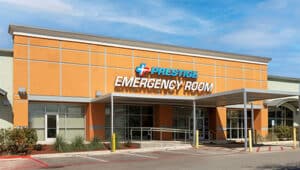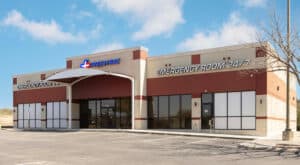A drug overdose is a medical emergency that can become fatal within minutes.
Recognizing drug overdose symptoms quickly and taking immediate action could save a life.
At Prestige Emergency Room, we’re available 24/7 to provide urgent, life-saving care for overdose emergencies across San Antonio.
What Happens During an Overdose?
During a substance use overdose, critical systems in the body, such as breathing, heart rate, and consciousness, can begin to slow down, shut down, or malfunction.
The effects vary depending on the type of drug, amount consumed, and how quickly help is received.
Common Substances Associated with Drug Overdose
Overdoses can happen with many substances, including:
- Prescription medications (opioids, benzodiazepines).
- Illicit drugs (heroin, cocaine, methamphetamines).
- Alcohol.
- Over-the-counter medications (acetaminophen, antihistamines).
- Combination of multiple substances (polydrug use).
Signs of a Drug Overdose: General Warning Signs
While symptoms vary depending on the substance, general overdose warning signs include:
- Difficulty breathing or slowed breathing.
- Loss of consciousness or unresponsiveness.
- Severe confusion or disorientation.
- Blue or pale lips, fingernails, or skin.
- Vomiting or gurgling noises.
- Seizures.
- Cold, clammy, or very hot skin.
- Extremely slow or rapid heartbeat.
If you notice any of these signs, call 911 immediately and stay with the person until help arrives.
Drug Overdose Symptoms by Substance Type
Different types of substances cause different overdose symptoms. Here’s what to look for:
Opioid Overdose: The Triad of Symptoms
Opioids like heroin, fentanyl, and prescription painkillers often cause:
- Pinpoint pupils (very small pupils).
- Unconsciousness or inability to wake.
- Slow, shallow, or stopped breathing.
This triad is classic for opioid overdoses and requires immediate intervention.
Stimulant Overdose: Recognizing the Warning Signs
Drugs like cocaine, methamphetamine, or ecstasy can cause:
- Rapid heart rate and high blood pressure.
- Chest pain.
- Agitation or extreme paranoia.
- Seizures.
- High body temperature (hyperthermia).
Stimulant overdoses can lead to heart attacks, strokes, or sudden death without prompt treatment.
Sedative and Depressant Overdose Symptoms
Medications like benzodiazepines or alcohol mixed with sedatives can cause:
- Drowsiness or inability to stay awake.
- Confusion or slurred speech.
- Impaired coordination and balance problems.
- Respiratory depression (dangerously slow breathing).
- Dangerously low blood pressure.
Depressant overdoses often cause breathing to slow to dangerous levels.
Alcohol Poisoning: When Drinking Becomes Dangerous
Severe alcohol intoxication (alcohol poisoning) symptoms include:
- Confusion and stupor.
- Vomiting.
- Seizures.
- Slow or irregular breathing.
- Hypothermia (low body temperature).
- Unconsciousness.
Alcohol poisoning is a true overdose emergency and requires immediate ER care.
What to Do for an Overdose: Immediate Response Steps
If you suspect someone is overdosing:
- Call 911 immediately.
- Stay with the person and monitor their breathing and responsiveness.
- Lay them on their side to prevent choking if they are unconscious but breathing.
- Provide basic first aid while waiting for emergency responders.
Quick action saves lives.
Overdose Treatment: First Aid While Waiting for Help
Taking the proper first aid steps can make a critical difference while waiting for emergency medical treatment.
Administering Naloxone for Opioid Overdoses
If you have access to naloxone (Narcan) and suspect an opioid overdose:
- Administer it immediately, following the instructions.
- If no improvement after 2–3 minutes, administer a second dose if available.
Naloxone can temporarily reverse the effects of opioid overdose, but it does not replace emergency care.
CPR and Rescue Breathing When Needed
If the person is not breathing:
- Begin rescue breathing or CPR if trained.
- Keep the airway open and try to maintain oxygen flow until help arrives.
Managing Seizures During an Overdose
If a seizure occurs:
- Move dangerous objects away from the person.
- Place soft padding under their head to prevent injury.
- Do not try to restrain them or put anything in their mouth.
What Not to Do During an Overdose Emergency
- Do not leave the person alone.
- Do not force the person to walk, eat, drink, or vomit.
- Do not put them in a cold shower. This can cause shock.
Emergency Medical Treatment for Drug Overdoses
At Prestige Emergency Room, emergency treatment for an overdose may include:
- Oxygen therapy.
- Intravenous fluids.
- Medications to counteract overdose effects.
- Seizure management.
- Respiratory support (intubation or ventilator assistance).
Quick ER intervention improves survival chances and minimizes complications.
After the Emergency: The Next Steps
Once stabilized, patients may need:
- Hospital admission for observation and additional treatment.
- Evaluation for organ damage (heart, brain, kidneys).
- Mental health assessment and care for substance use disorders.
Recovering from an overdose is a critical first step toward long-term health and healing.
Supporting Someone After an Overdose
Support for a loved one after an overdose includes:
- Encouraging follow-up medical and mental health care.
- Helping them access treatment for substance use.
- Providing compassionate support that reduces stigma.
- Being educated about relapse risks and overdose prevention.
Kindness and understanding can make a real difference in someone’s recovery journey.
Prevention Strategies: Reducing Overdose Risk
Help prevent overdoses by:
- Using medications exactly as prescribed.
- Never mixing substances (especially alcohol with drugs).
- Keeping naloxone accessible for someone who is at risk.
- Educating yourself and others about overdose risks.
- Encouraging loved ones struggling with substance use to seek help.
Early action and education save lives.
Prestige ER’s Approach to Drug Overdose Emergencies in Texas
At Prestige Emergency Room, we understand the urgency and complexity of overdose emergencies.
Our team provides:
- Rapid, expert diagnosis and treatment.
- Immediate airway and breathing support.
- Compassionate, nonjudgmental care.
- 24/7 emergency services across San Antonio.
If you or someone you know shows signs of a drug overdose, don’t hesitate; get emergency care immediately. Use our location finder to access the nearest Prestige ER for drug overdose treatment.
In critical drug overdose emergencies, immediate professional care makes all the difference. Prestige ER delivers life-saving overdose treatment when every second matters.












